Tiffanymesso
On this page, you find all documents, package deals, and flashcards offered by seller tiffanymesso.
- 12
- 0
- 0
Community
- Followers
- Following
12 items
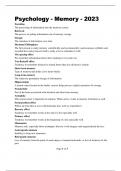
Psychology - Memory - 2023 questions and answers
The processing of information into the memory system Retrieval The process of getting information out of memory storage Storage The retention of information over time Hermann Ebbinghaus The first person to study memory scientifically and systematically; used nonsense syllables and recorded how many times he had to study a list to remember it well
- Exam (elaborations)
- • 3 pages •
The processing of information into the memory system Retrieval The process of getting information out of memory storage Storage The retention of information over time Hermann Ebbinghaus The first person to study memory scientifically and systematically; used nonsense syllables and recorded how many times he had to study a list to remember it well

TNP Scenario for TNCC
After receiving pre-hospital report Activate Trauma Prepare for Patient What equipment do you need? Put on PPE A patient has just arrived Across the Room Assessment Uncontrolled Bleeding AVPU & Airway AVPU: - Alert - Verbal - Pain - Unresponsive Airway - : Loose/Missing Teeth : Tongue Obstruction : Foreign Object : Edema : Secretions : Snoring/Stridor/Gurgling : Deformity Breathing : Spontaneous Breathing : Symmetrical Rise/Fall Chest : Depth/Respiratio...
- Exam (elaborations)
- • 4 pages •
After receiving pre-hospital report Activate Trauma Prepare for Patient What equipment do you need? Put on PPE A patient has just arrived Across the Room Assessment Uncontrolled Bleeding AVPU & Airway AVPU: - Alert - Verbal - Pain - Unresponsive Airway - : Loose/Missing Teeth : Tongue Obstruction : Foreign Object : Edema : Secretions : Snoring/Stridor/Gurgling : Deformity Breathing : Spontaneous Breathing : Symmetrical Rise/Fall Chest : Depth/Respiratio...
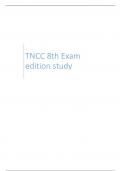
TNCC 8th Exam edition study with verified solutions
1.What is the effect of hypothermia on the oxyhemoglobin dissociation curve Hemoglobin does not readily release oxygen for use by the tissues A shift to the left occurs in an environment of low metabolic demand (hypothermia, hypocapnia, alkalosis), increasing hemoglobin's affinity for oxygen. EMS arrives with the intoxicated driver of a car involved in a motor vehicle crash. EMS reports significant damage to the driver's side of the car. The patient is asking to have the cervical collar re...
- Exam (elaborations)
- • 8 pages •
1.What is the effect of hypothermia on the oxyhemoglobin dissociation curve Hemoglobin does not readily release oxygen for use by the tissues A shift to the left occurs in an environment of low metabolic demand (hypothermia, hypocapnia, alkalosis), increasing hemoglobin's affinity for oxygen. EMS arrives with the intoxicated driver of a car involved in a motor vehicle crash. EMS reports significant damage to the driver's side of the car. The patient is asking to have the cervical collar re...
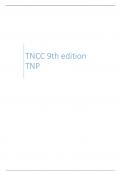
TNCC 9th edition TNP questions and answers
just keep evaluating - vipp What does the J stand for at the end of the secondary survery? vital signs, injuries/interventions, primary survey, pain What does VIPP stand for? flank During the head-to-toe, where would you find Grey-Turner's sign? umbilicus During the head-to-toe, where would you find Cullen's sign? inspecting posterior What is sometimes deferred at the end of the head-to-toe? AFTER head-to-toe, BEFORE J (VIPP) Antibiotics, consults, head CT, imaging, law enforcement,...
- Exam (elaborations)
- • 14 pages •
just keep evaluating - vipp What does the J stand for at the end of the secondary survery? vital signs, injuries/interventions, primary survey, pain What does VIPP stand for? flank During the head-to-toe, where would you find Grey-Turner's sign? umbilicus During the head-to-toe, where would you find Cullen's sign? inspecting posterior What is sometimes deferred at the end of the head-to-toe? AFTER head-to-toe, BEFORE J (VIPP) Antibiotics, consults, head CT, imaging, law enforcement,...

TNCC 8th with verified solutions
The nurse is caring for a 120 kg male brought in after a warehouse fire and is calculating the patients fluid resuscitation needs. He has painful red blistering to the entire surface of both upper extremities and superficial burns to the anterior chest. Using the modified Lund and Browder chart to calculate the total body surface area burned, how much IV fluid would be administered in the first 8 hours? 2280 mL 3840 mL A fluid total of 3840 mL is not correct because only partial or full thickn...
- Exam (elaborations)
- • 4 pages •
The nurse is caring for a 120 kg male brought in after a warehouse fire and is calculating the patients fluid resuscitation needs. He has painful red blistering to the entire surface of both upper extremities and superficial burns to the anterior chest. Using the modified Lund and Browder chart to calculate the total body surface area burned, how much IV fluid would be administered in the first 8 hours? 2280 mL 3840 mL A fluid total of 3840 mL is not correct because only partial or full thickn...
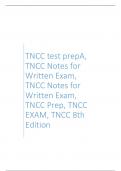
TNCC test prepA, TNCC Notes for Written Exam, TNCC Notes for Written Exam, TNCC Prep, TNCC EXAM, TNCC 8th Edition
Expedite transfer to the closest trauma center - A 56 y/o M pt involved in a motor vehicle crash is brought to the ED of a rural critical access facility. He complains of neck pain, SOB, and diffuse abd pain. His GCS is 15. His VS: BP 98/71, HR 125, RR 26, SpO2 94% on high-flow O2 via NRB mask. Which of the following is the priority intervention for this patient? a pertinent medical hx is crucial - Which of the following considerations is the most important when caring for a geriatric trauma ...
- Exam (elaborations)
- • 87 pages •
Expedite transfer to the closest trauma center - A 56 y/o M pt involved in a motor vehicle crash is brought to the ED of a rural critical access facility. He complains of neck pain, SOB, and diffuse abd pain. His GCS is 15. His VS: BP 98/71, HR 125, RR 26, SpO2 94% on high-flow O2 via NRB mask. Which of the following is the priority intervention for this patient? a pertinent medical hx is crucial - Which of the following considerations is the most important when caring for a geriatric trauma ...

TNCC exam with questions and answers
1. Preparation and Triage 2. Primary Survery (ABCDE) with resuscitation adjuncts (F,G) 3. Reevaluation (consideration of transfer) 4. Secondary Survey (HI) with reevaluation adjuncts 5. Reevaluation and post resuscitation care 6. Definitive care of transfer to an appropriate trauma nurse Initial Assessment 1. A- airway and Alertness with simultaneous cervical spinal stabilization 2. B- breathing and Ventilation 3. circulation and control of hemorrhage 4. D - disability (neurologic stat...
- Exam (elaborations)
- • 11 pages •
1. Preparation and Triage 2. Primary Survery (ABCDE) with resuscitation adjuncts (F,G) 3. Reevaluation (consideration of transfer) 4. Secondary Survey (HI) with reevaluation adjuncts 5. Reevaluation and post resuscitation care 6. Definitive care of transfer to an appropriate trauma nurse Initial Assessment 1. A- airway and Alertness with simultaneous cervical spinal stabilization 2. B- breathing and Ventilation 3. circulation and control of hemorrhage 4. D - disability (neurologic stat...

TNCC written exam with 100% solutions
What is the best measure of the adequacy of cellular perfusion and helps predict the outcome of resuscitation? Base deficit used in conjunction with serum lactate Will hypocapnia cause vasoconstriction or vasodilation, especially in the cerebral vasculature? Vasoconstriction What results from tissue hypo perfusion and oxygen deficit? Metabolic acidosis What type of shock results in generalized vasodilation? Neurogenic shock Spinal cord injuries at C3-C5 causes loss of what nerves functio...
- Exam (elaborations)
- • 9 pages •
What is the best measure of the adequacy of cellular perfusion and helps predict the outcome of resuscitation? Base deficit used in conjunction with serum lactate Will hypocapnia cause vasoconstriction or vasodilation, especially in the cerebral vasculature? Vasoconstriction What results from tissue hypo perfusion and oxygen deficit? Metabolic acidosis What type of shock results in generalized vasodilation? Neurogenic shock Spinal cord injuries at C3-C5 causes loss of what nerves functio...
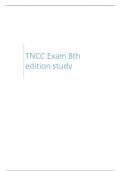
TNCC Exam 8th edition study
1.What is the effect of hypothermia on the oxyhemoglobin dissociation curve Hemoglobin does not readily release oxygen for use by the tissues A shift to the left occurs in an environment of low metabolic demand (hypothermia, hypocapnia, alkalosis), increasing hemoglobin's affinity for oxygen. EMS arrives with the intoxicated driver of a car involved in a motor vehicle crash. EMS reports significant damage to the driver's side of the car. The patient is asking to have the cervical collar remo...
- Exam (elaborations)
- • 8 pages •
1.What is the effect of hypothermia on the oxyhemoglobin dissociation curve Hemoglobin does not readily release oxygen for use by the tissues A shift to the left occurs in an environment of low metabolic demand (hypothermia, hypocapnia, alkalosis), increasing hemoglobin's affinity for oxygen. EMS arrives with the intoxicated driver of a car involved in a motor vehicle crash. EMS reports significant damage to the driver's side of the car. The patient is asking to have the cervical collar remo...
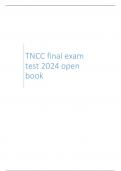
TNCC 2024 open book
Why is a measure of serum lactate obtained in the initial assessment of the trauma patient? Answer: c a) to measure oxygenation and ventilation b) to quantify the base deficit for the adequacy of cellular perfusion c) to gauge end-organ perfusion and tissue hypoxia * d) to determine the underlying cause of shock A trauma patient is restless and repeatedly asking "where am I?" vital signs upon arrival were BP 100/60 mm Hg, HR 96 beats/min, and RR 24 breaths/min. Her skin is cool and dry...
- Exam (elaborations)
- • 13 pages •
Why is a measure of serum lactate obtained in the initial assessment of the trauma patient? Answer: c a) to measure oxygenation and ventilation b) to quantify the base deficit for the adequacy of cellular perfusion c) to gauge end-organ perfusion and tissue hypoxia * d) to determine the underlying cause of shock A trauma patient is restless and repeatedly asking "where am I?" vital signs upon arrival were BP 100/60 mm Hg, HR 96 beats/min, and RR 24 breaths/min. Her skin is cool and dry...
